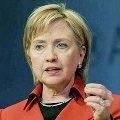Clinton used the speech at Washington's Newseum, which houses a portion of the former Berlin Wall, to warn of efforts by some governments around the world to erect "virtual walls" to bar access by their people to portions of the Internet. "They've expunged words, names and phrases from search engine results," she said. "They have violated the privacy of citizens who engage in non-violent political speech." "These actions contravene the Universal Declaration on Human Rights, which tells us that all people have the right 'to seek, receive and impart information and ideas through any media and regardless of frontiers. ' With the spread of these restrictive practices, a new 'Information Curtain' is descending across much of the world," she added. Clinton's remarks came amid a controversy over charges by the U.S.-based Internet search engine company Google that the Beijing government has censored its Chinese site and targeted Google e-mail accounts of Chinese human rights activists. While saying Internet sites available in China must conform to local laws, China has denied launching cyber attacks on Google and other sites.
Clinton listed China, along with Tunisia, Uzbekistan, Egypt, North Korea and Vietnam, among others, as countries where the flow of information on the Internet has been impeded.
She said the United States looks to China to conduct a thorough and transparent investigation of the cyber intrusions that have led Google to threaten to cease operations there.
"The Internet has already been a source of tremendous progress in China," said Clinton. "And it is fabulous that so many people there are now online. But countries that restrict free access to information or violate the basic rights of Internet users risk walling themselves off from the progress of the next century [the 21st century]. The United States and China have different views on this issue. And we intend to address those differences candidly and consistently." Clinton said that as dictatorships of the past tried to block dissident activity like underground publishing, governments today are targeting independent thinkers using Internet tools.
She said cell phone pictures of the murder of a young woman protesting Iran's disputed presidential election last June provided what she called a "digital indictment" of the Tehran government's brutality. "We've seen reports that when Iranians living overseas posted online criticism of their nation's leaders, their family members in Iran were singled out for retribution," said the secretary of state. "And despite an intense campaign of government intimidation, brave citizen journalists in Iran continue using technology to show the world and their fellow citizens what is happening inside their country." Clinton said Iranians speaking out on behalf of human rights have inspired the world, and that their courage is redefining how technology is used to spread truth and expose injustice.
The Secretary said the Obama administration is urging U.S. Internet companies to take a "principled stand" against censorship efforts overseas, and that it is reinvigorating an inter-agency Global Internet Freedom Task Force.

